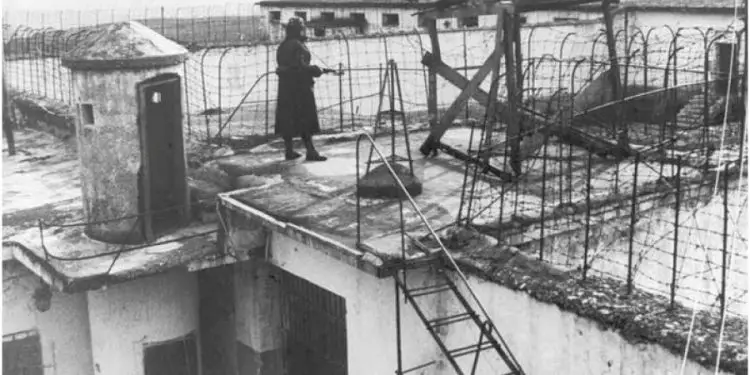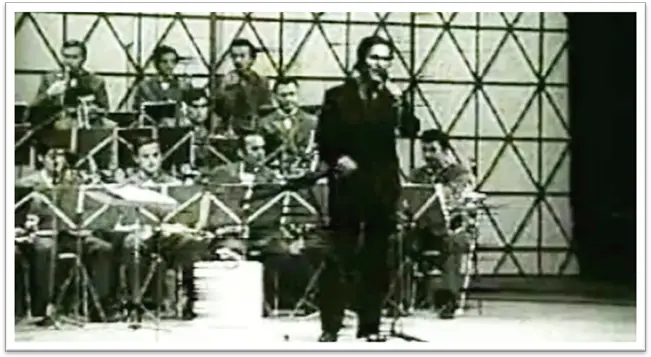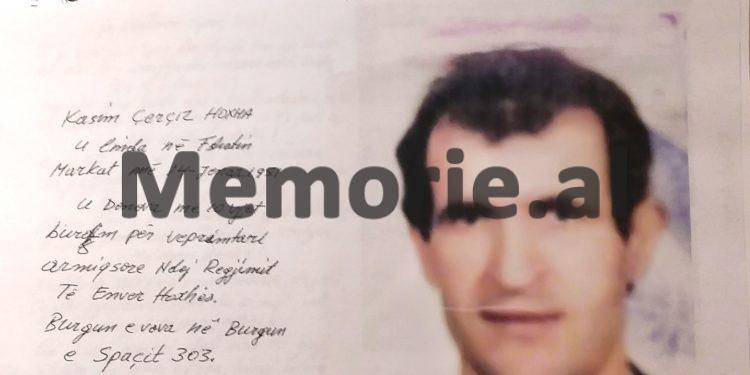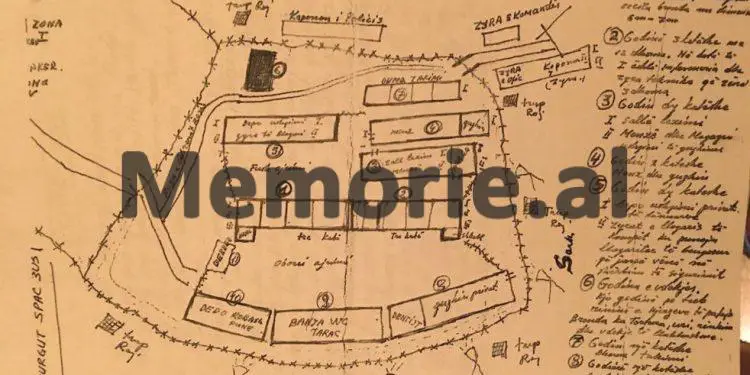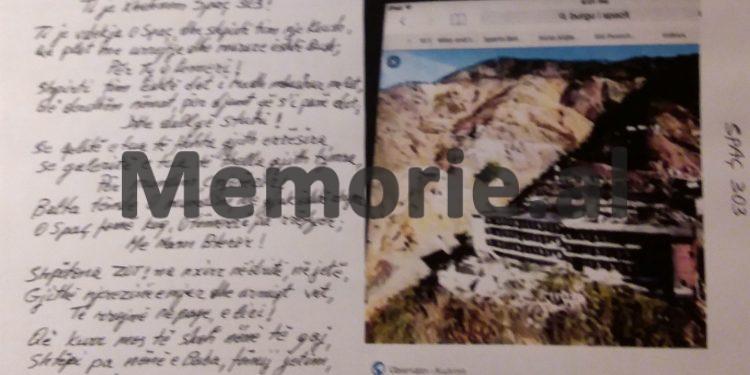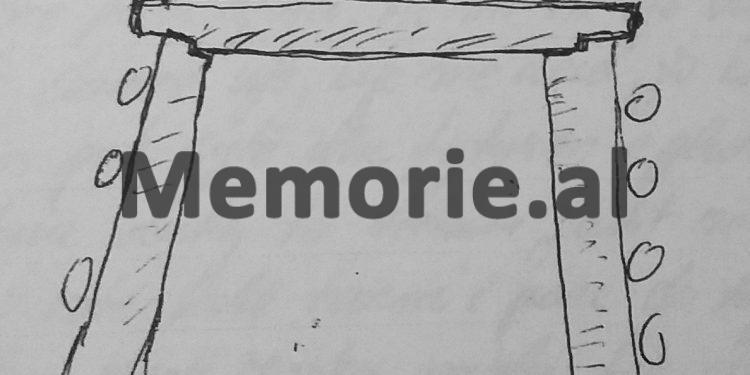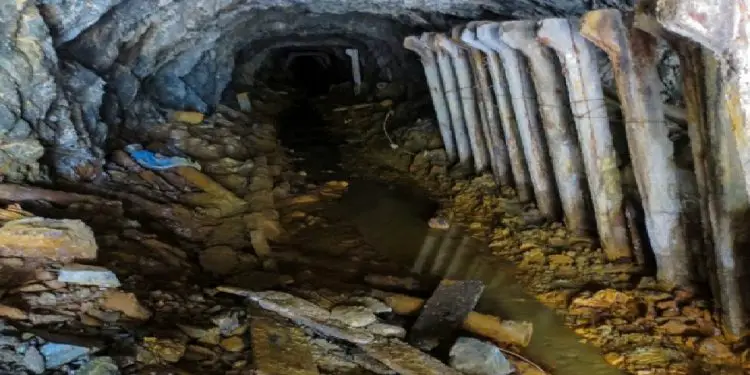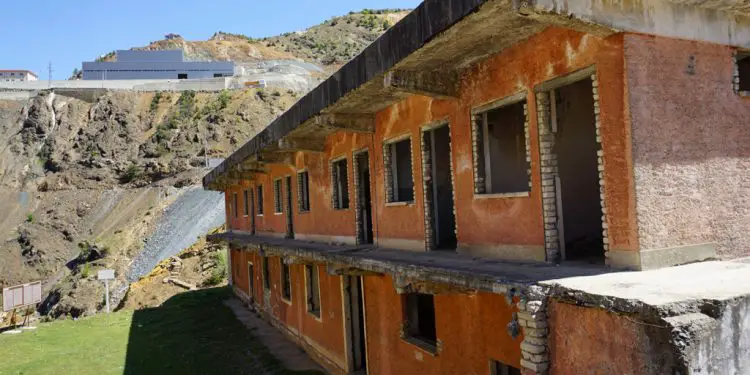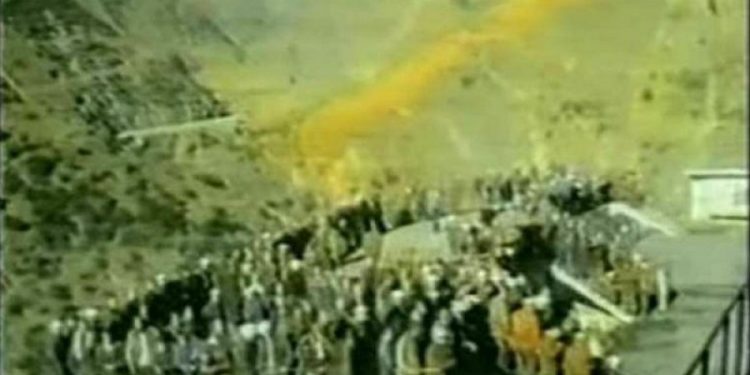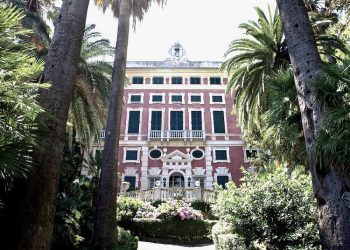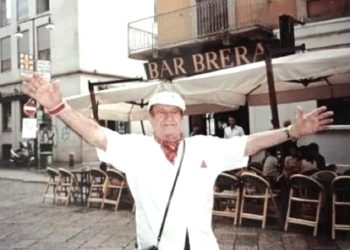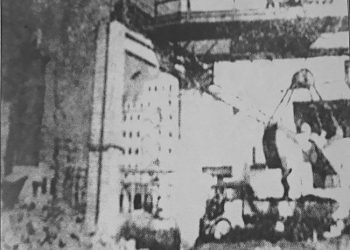Dashnor Kaloçi
part six
Memorie.al publishes some parts of the voluminous autobiographical book in manuscript “Beautiful land, ugly people” (memories from hell) by the author, Kasem Hoxha, originally from the village of Markat in Saranda and living in the USA since 1985, when he fled Albania after suffering ten years in the prisons of Enver Hoxha’s communist regime. The whole sad and painful story of Kaso Hoxha, from the life and hard work in his village in the southernmost part of the country, the dissatisfaction with the regime and the first poems of a political nature, how they fell into the hands of the State Security and who were his relatives who spied on him, the arrest in the office of the Chairman of the People’s Council of Markat village, by the State Security on June 21, 1973, the investigation in the Saranda Branch of Internal Affairs, the trial against him and the sentence with 10 years in prison for “agitation and propaganda”, staying in “Kaushin” of Tirana (Ward 313), and the prisoners he found there, being sent to Spaç and working in that camp with criminal and “soft” police officers, the accomplices of description of their “portraits” with positive and negative sides, release from prison and return to the countryside, escape to Greece and stay in the Lavros camp, gaining political asylum in the USA, correspondence with Amnesty International, e London branch, inf information with the data he sent to the prisoners of Spaç and the communist regime in Albania, to the creation of a new family and life and work in that distant place with the Cham community divided by the intrigues of the people of the State Security from Albania operating there.
Excerpts from the manuscript book, “Beautiful land, ugly people“, (memories from hell) of the author, Kasem Hoxha, sent by him exclusively for Memorie.al
Prologue
Dear readers!
Do not pay attention to the title I am presenting to you, I mean, if you are not patient to read this collection of memoirs, if you want to forgive the author, that his style is pale, uninspired before this drama of great, of my people, of my martyred nation.
My characters are not created by my imagination, but are real people, they are your brothers, your fathers, your relatives. The events are not fictional, but real and lived. You will convince yourself, only after reading this summary with memories. You will find something from your life, something real from the lives of your fathers, your mothers, your brothers, how they suffered and how they died.
I wrote this collection of memories about the legacy left to me by my friends, for the world to learn the truth, how innocent people were tortured, how they suffered, how they died, in the camps and prisons of the executioner, Enver Hoxha!
I go with the hope that any reader, Albanian or foreign, is not left with hatred, from criticism, beating opposing opinions, as it is the best way to find the truth. The title of the book, “Beautiful land, ugly people”, will anger the reader, but in the end, I will conclude that I have the right to call it “The 45-year era of the satanic communist regime of Enver Hoxha”: Ugly.
I, alas, for the misfortune I had, saw and lived the great drama that happened before my eyes. I am neither a poet nor a orator, I will need hard work to escape the literary mistakes in this historical book, which can inspire future poets and writers, on the tragedy of our time, of the darkest time of my nation !
Ladies and Gentlemen, I wish you all freedom and peace…!
Kaso Hoxha.
Llavrio, Greece 1985
follows from the previous number
The prisoners I met in “Kaushin” of Tirana!
In this small cage, closed like a grave, it seems as if time does not move at all. We had the right to go out three times in the WC, and one hour in the airing yard they called “Pajtos”. The days seemed too long and sitting quietly waiting for meals from the small window like a crack stuck in the bars, a ray of light penetrated. It was the only gift the Lord sent us, which made us distinguish our walls, faces, and hands.
Sitting on a mattress filled with “Byk” straw, with my arms crossed, squinting my gaze beyond the crossed bars of this window, in that endless sky corner, I felt myself stuck deep where I was, in that bucket of old, resembling a concrete tomb. In that torturous darkness, where the cold pounded from all sides, from that window like a crack, in that concrete wall penetrated the noise of the city, which during the day came and got bigger, during while in the evening, it came to calm down, but not quite. Working train sirens, the monotonous noise of factories, never ceased.
I was sitting and thinking without opening my head for the conversations, the groans that were heard in our whole little “Kaushi”. There have always been rich, but more miserable, poor, unfortunate, I said in my mind, when I was seeing Padre Mark in the corner of the second floor, where he was packing a piece of marmalade. Guess what, I reasoned, even here within the concrete walls there is no equality!
The prison is an untold garden, where the lowest, most animalistic vices, raised in the system, stimulated from above, to degenerate people politically and morally, flourish. These miserable people have the misfortune to undergo the most typical methods and forms until they kneel down, until they hate themselves, until they physically eliminate them.
Prison has something horrible, or rather horrible. It seems to you as if you are out of time and space, as if you are in some corner of Hell, where people are tormented by the suffering of isolation, of chronic hunger. We wait for the meals impatiently, to get that piece of bread 200 gr. And a spoonful of boiled water, where they swim about 15-20 grains of rice for dinner, which they call “soup”, and in the morning, a spoonful of black water, which they call “tea”, without any sweetness. Can hunger be quenched with such food?! I wondered how these people endured and did not die from this torture, the most inhuman on earth?! Where was that magical force that kept them alive for years? How? What? Why? … I could not have an answer!
The meeting in “Kaush” with Rexho Plaku, was in prison since 1946
One afternoon, at the end of October, the door opened and three elderly prisoners entered. As usual, we welcomed them, comforting them: “past”. They said that they came from the Hospital – Prison, which was close to the Hospital No. 2. They seemed more tired from age and I noticed they were shivering from suffering the disease. I was very sorry. There were a couple of empty mattresses on the ground floor, where I was lying. One of them, about 70 years old, approached me and prayed if I could sit down next to him. I helped her sit next to me. In his hand he held an old bag full of nuts. After laying the blanket with my help, he asked me:
– “Are you a young prisoner?” – “Yes! I gave it back ”
“Where did you get the boy?” asked the old man again.
“I am from the Saranda area, uncle,” I replied. The old man turned straight, noticed me with many remarks and immediately asked me:
– “From which village son?”,
– “Markati” habit the old man was surprised that I still did not know his name.
– “Markati?” Pla surprised the old man “Po Markati” I continued.
– “Whose are you from Markati, son”? Asked the old man again.
“Why, sir, are you on that side too?” I asked.
– “Yes, I am from Konispoli, my name is Rexho Plaku, if you have heard!” he replied.
I was stunned in my corner, I could not believe what was happening, was it real?!
I knew a lot about Rexhon, he was the first together with Haki Rushiti, who formed the “Çamëria Çeta” during the period of occupation of Albania in the Second World War.
Rexhua, told me the whole drama of his life. His sister was the wife of Rear Admiral Teme Sejko (who was executed by the regime of Enver Hoxha), while his friend, Haki Rrushiti, managed to escape after the war and died in exile. Rexho Plaku, was in prison since 1946, he did not accept Enver’s system and it cost him a lot. Rexhua gave me valuable information about prison life. He advised me: ‘be careful that there are many provocateurs and spies in prison’. Rexhua told me that he knew many good people in Spaç, such as Xhemal Balin, Dervish Sulon, Idriz Allunin and many others.
I put Rexho’s valuable advice in the “pocket” of my mind. I was not fed up with Uncle Rexho’s interesting conversations. One day while we were walking in the airing yard called “Pajtos”, he said to me: – “I would like so much to do some laps, but you will forgive me, because I will sit down, I do not have heels”. “No,” I replied, “there is no need, I will sit with you here in the yard.” How glad he was that I made friends with him. Rexhua could hardly breathe, from weakness and old age. “Excuse me uncle Rexho, I’m tired, I have so many questions”, I said apologizing to Rexho the Elder.
-“No, no, my son, do not say it,” replied Rexho immediately.
– “It is a special pleasure that God made it possible for me to meet you, you are young, so I tell people how we suffered. I believe that I will not see you again, you will surely go to Spaç, I can leave for Ballsh, tomorrow or the day after tomorrow “, Rexho concluded the conversation. And so, it really happened, the next day, that in the morning, the police opened the door and read the names of the prisoners who were going to Ballsh, who were: Lluk Kaçaj, Stavri Rafaeli, Rexho Plaku and some others, who did not I remember. I greeted Reggio, wished him goodbye, I keep his memory in my heart.
How did I meet Sherfif Merdan in prison?
In our “Kaushin”, with more than 17-18 prisoners, some slept in cement. Then it was as if we were relieved a little, because every week sick old people came from the prison hospital and they did not wait more than a week, because the Bus Station was full of ordinary prisoners. The Ballsh camp was divided into two parts, ordinary and political. The political prisoners of the Ballsh camp were mostly elderly. The young people were taken to Spaç to work in the copper mine, so I expected other prisoners to come to fill the Autoburg.
The next day, the door opened and a young man came in to give an impression of how much he had finished in the army. He seemed glad he was shifting people. He greeted us and told us that his name was Sheme and he was from Tepelena district. “Do not worry,” Tanushi told me, “now it is three o’clock for Spaç prison”, continued the one who knew that I could not stand that stinking darkness from the tobacco smoke that the prisoners drank.
The next day the door was reopened and police officer Skënderi ordered the young prisoner who appeared next to the door to enter. The young prisoner greeted us: “Good to find you friends,” he said with a smile. He was a stylish young man, dressed in the latest fashion clothes, his hair was starting to fall out and here and there it looked premature gray. Without giving us the opportunity to ask who this boy is, he said: “I am Sherfif Merdani, I believe you have heard my songs”, he spoke, extending his hand to make land with everyone.
I was stunned in my corner; I could not believe my eyes. Tanushi, always ready for the newcomers, got out of his bed on the third floor, comforted the Sherif, and quickly, roasted him a coffee. The day before, Tanushi and I were discussing the song “Mother”, which was given by the prison radio while we were in the corridor to go to the WC. Tanushi told me: “If I am not mistaken, he sings this song, Sherif Merdani”, “No ‘, I returned it,’ this singer who sings, is Tonin Tërshana”, I opposed Tanushi, because I knew him very well, his sweet voice of Sherif Merdan. Tanushi immediately started talking to Sherfi, telling him that the day before, he was arguing with me about who was singing the song “Mother”. “I opposed Kasem, he is right.”
The Sherif showed us his drama. After the 11th Radio-Television Song Festival, the Sherif worked in the Librazhd district where he was a high school teacher. The 11th Song Festival that took place in December 1972, made a big fuss and was welcomed by the Albanian public, for the beautiful music, the songs that were mostly sung to love and not to Enver of the Party! But a few days later, the Festival was criticized by Enver himself, as a festival with decadent music. Immediately, the dictator held the IV Plenum of the Central Committee of the ALP, where he initially criticized the Ministry of Education and Culture, the League of Writers and Artists, Radio-Television, etc. He later sentenced his comrades: Fadil Paçrami, Todi Lubonja, as well as Mihal Luarasi and many other writers and artists to severe imprisonment. One of these victims was Sherif Merdani, who was now locked in this dark “Kaush”. To me the Sherif was a star of this festival and would remain so. I can say without hesitation, that the arrival of the Sherif gave me courage, I felt that I was not alone in this world. Even though we were living very difficult moments of life, this man revived me with his courage, with his optimism, as if he knew that this would not be the end.
He sang, whistled, saying to me: “Do not be upset Kasem, there will be good days for us.” The Sherif had no bitterness in his heart, but divine musical sounds that kept the hope alive, not only of the Sherif, but of all those comrades who surrounded him. Every day I listened with pleasure to this man, whom I called “Find”. I was overjoyed to get to know him.
On November 6, at 10 o’clock in the morning, the police opened the door and with a list in hand, read the names of the prisoners: Qani Çollaku, Lavdosh Sheme, Kasem Hoxha, Sherif Merdani and a couple of others, ordered us to take the loot and get out into the prison corridor. We rejoiced that we were coming out of this grave, but we did not know that we would go to a grave, even more terrible. They tied us two by two with irons, Sherfi and I were tied together. Sherfi, as always in good spirits, whispered in my ear: “They are taking us to Spaç”, and continued: “Do not worry Kasem, there he is and my cousin, Ylber Merdani….”.
The Sherif, during more than two weeks in Tirana prison, told me about the drama of his life. The communist regime of Enver Hoxha imprisoned his father and mother, the entire Merdanaj tribe, for the sole “fault”, because they were rich people. The Sherif hardly finished his studies, but the regime gave him a job in an underdeveloped country, rather to isolate this talent, but nevertheless, the Sherif excelled. And now the dictator was putting him in the living grave, to extinguish that sweet voice forever. After more than three hours of driving that prison car, where there was no ventilation hole, we arrived in Spaç. We boundly expected to mingle with the crowd.
We were handcuffed and the guard officer, Jovan Andoni, ordered the policeman, Pjetër Koka, to take us to the big prison, where no one was seen in the yard. After the May 21 Revolt of that year, the prison was under a strict, torturous regime. The prisoners were forced to stand in line for hours to listen to the works of Enver Hoxha and the heavy workload in the mine, which they called the “work cycle”.
The landscape of Spaç, when I got out of the prison car, terrified me! Mountains with a dark lead color, surround on all four sides this pit named Spaç. In fact, God had built a natural prison there, coming to the aid of Enver Hoxha for his criminal affairs. The eye did not see any green leaves in that gloomy and extremely desolate landscape. From every side you looked, you saw abysses and black ravens. The stream that flowed under the dungeon brought brown to yellow water from the acidity of the mine. A couple of houses on the other side of the mountain, as if giving life to this dead area. Not even in the spring did you see or hear the songs of birds, only the howls of wolves, of savages mingled with the all-out insulting shouts of the murderous, Mirditor cops.
Walking shyly with the Sherif and other companions, descending the stairs towards the grave prison. Policeman Pjetër Koka, led us forward. The prison was built on very steep terrain. There is a square some 30 meters long and 8 meters wide in front of the prison, and one that serves as a volleyball court behind the prison. Two buildings of three floors each with a length of about 50 meters, with 24 cages, which locked inside more than 1500 prisoners. In front of the three-storey buildings, there was a WC, bathroom, private kitchen and near the exit gate for work, a warehouse for work clothes, and next to the barracks that we called “Berberhane”.
The policeman took us to the clothes depot, they gave us two old blankets, brown jackets and pants, an old hood, a pair of rubber bands, and underwear.
The Technical Office, headed by some regime spy prisoners, such as Kujtim…, Loli…., Hajdar., Had made a plan in which area of the mine we newcomers would work. The Sherif and I were taken to the second floor, room no. 7, a brigade led by the spy prisoner Besnik…! As soon as we entered the cage, the prisoners welcomed us with great kindness. We put the clothes we were holding in our hands on the empty beds and greeted everyone who was inside the bin, introducing who we were and what area of Albania we were from.
Prisoners came from other rooms to meet me, the most interested was Behar Kodra, this was the one who spread the news to the prisoners, who came and who left, even telling the prisoners what soup was cooked in the kitchen for lunch. The inmates of the room helped us to make the beds according to the rules. The brigadier told us the rules of the prison. I took a seat on the second floor, on the
left side slept a fat man with a black mustache called Zeqir Alia, on the right an average man who was over forty, bald, called Zydi Hoxha.
There were more than 40 prisoners in the room, and Gjin Marku came in swearing at the prisoners and said, “Go to your bed!” He asked the prison brigadier if he made clear to us the prison and labor regulations. The Loyal Q ada Brigade was the third shift that week and he told us: “Tellalli wakes up at 10 pm, you will quickly line up in the field behind the prison, after everyone has lined up, we will be given dinner, after the meal you have to prepare for work, line up on the terrace.
At eleven o’clock, you will enter the gallery, you must realize the norm, otherwise, you will be sentenced to prison, up to a month of isolation! At 7 o’clock in the morning we will go back to the prison, you have to do your personal needs quickly, you will line up in the same place to have breakfast. After breakfast, the tellall will talk about the general appeal of the prison, you must quickly line up according to the brigades on the terrace. After the appeal is over, the third shift goes to sleep, while the second shift and “unemployment” line up in the field behind the prison, where the works of Comrade Enver are read for four hours (which was really a terrible torture, because for 4 hours you have to sit in the rain, in the snow and in the heat of July to listen to A. Xh. and Paulin V…, these were the readers of the works).
“At 3 o’clock in the afternoon, the third shift wakes up and again you will have lunch, you will wait for the evening appeal, the works of Comrade Enver will be read from 4 o’clock to 8 o’clock in the evening, and at 10 o’clock, you will go again at work “, concluded Brigadier Besnik Q…. As it turned out in this regulation, we did not even have time to do sh….!
Guests came to our room! The first cousin came to meet the Sherif, to meet him, Ylber Merdani from Korça, and me a villager from Verva, Xhemal Bali, with a friend of his Feti Kumanaku, from Fier. They brought me some food, assuring me that on Sunday which was a day off, we would talk about everything. Uncle Rexhua told me in the prison of Tirana, that: in Spaç you will find Xhemal Balin, he had been imprisoned for more than 15 years, but that he looked very good from his health condition, his young age, even though he was 36 years old, seemed younger.
That night the Sherif and I went to the third shift, we were assigned to do the miner work, a very hard and high-risk job. When the throat of the gallery swallowed all the smoke with poisonous gases, I thought this was the end. I had no strength in my arms weakened by torture and hunger. Hidajet Vesho, would instruct me how to use the hammer to open 10-15 holes for mines. The front of the gallery was too far away and, in our hands, we held the carbide candles to lighten the darkness. In the working group were three people, two material loading workers and the miner.
“This is the work cycle”: (Hidajeti told me). “You have to clean this crack, I believe that there will be some 12-14 material wagons, (copper) after you have cleaned it, you will put 2 to 4 pairs of bodies to secure the gallery and then you will open the holes in the front for the crack. You have to do this every day, now look at us how we work, tomorrow you are alone “, Hidajeti finished the instruction and you start working with the two friends of the group, Zeqiri and Hajrina. I went after Hidayat, he would tell me how I would prepare the wooden bodies to secure the front of the gallery from collapsing.
He showed me how to place them, how to make sure they did not fall from the mine blast. (I am outlining to you what a pair of wooden bodies looks like). I had to prepare three or four pairs for each day, for each work cycle or otherwise end up in isolation cells. Zeqiri and Hajri were good workers, sweat was drained streams, though they had removed their half-naked clothes in this heat of more than 40 degrees, when they cleaned it, Hidajet began to place the prepared bodies. We still had three hours left to place the bodies and make the mine holes.
Hidajet gave me some very valuable advice, he told me: “Try to start making burrows earlier than others”! Why did I ask him? “Because the air pressure drops and you will stay on the Martel for hours,” he returned. And indeed, Hidayat placed the troops at once, took the pistol to open the holes, and in half an hour finished them. The holes had to be more than 60 cm., Otherwise the policemen who planted the mines would not accept them! Hidajet finished his work cycle one hour ahead of schedule. He took me to a place in the gallery where a lot of water was coming out. Acidic water, not good to drink and with it we left a little dusty
eyes and face. We had to leave the gallery at 7 o’clock in the morning, at which time the first shift would enter the gallery./Memorie.al
Continues tomorrow




